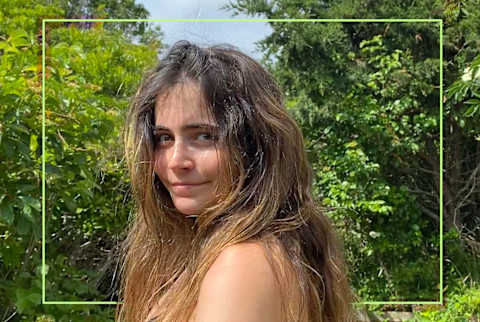I Was Diagnosed With OCD At Age 12 & It's So Much More Nuanced Than People Realize

When I was 12 years old, I was diagnosed with obsessive-compulsive disorder (OCD). This realization would ultimately shape my experience of life in both beautiful and painful ways, some of which I continue to uncover as I grow older.
The road to a diagnosis.
I didn't notice that my brain functioned all that differently from a lot of the kids around me until I was asked to speak with the school psychologist in fifth grade. She had noticed that during math class, I would touch my workbook to my nose before opening it. I also had a tendency of tracing lines on the gym floor and counting steps on staircases. Somewhat mysteriously, I also experienced moments when I couldn't help but start crying. These occurrences made me fearful about spending time with friends and even attending school; I felt like it could happen at any time, and I didn't know why. After this initial meeting, my family decided to take me to a psychologist outside of school, to determine what was going on.
My psychologist came to the clear conclusion that my symptoms matched those of obsessive-compulsive disorder, or OCD. This condition manifests differently from person to person, but broadly speaking, it refers to someone whose brain creates fears (obsessions) and then methods to prohibit those fears from coming true (compulsions). The throughline is that both are irrational.
Receiving this information had a big impact on me: It was comforting because it explained a lot of what I was experiencing (I remember getting in my dad's car and declaring, "Turns out, I have a disorder."). It was also overwhelming because it clarified the magnitude of my "quirks" and marked the beginning of years of committed cognitive restructuring.
Navigating my OCD.
A lot of my early obsessions and compulsions were quite concrete: The former had to do with fears around cleanliness and symmetry, while the latter usually involved physical actions. I worked with my psychologist to identify behaviors that weren't serving me and to practice response prevention (simply put, not acting on the compulsion elicited by the obsession).
One of the tricky characteristics of OCD is that oftentimes, once you overcome one fear, another pops up in its place. As I curbed the need to touch things to make them even or constantly ensure cleanliness, other, less concrete fears arose.
I started to experience intense social fears around saying the wrong thing or accidentally offending someone. I was always known as a kind person, but part of it was motivated by intense fear and a subsequent urge to seek reassurance. I would apologize to people for things that they hadn't even noticed, or mentally spell out each word of a sentence I just had uttered to ensure that I didn't say anything "wrong."
OCD has caused me great suffering, and it has also caused immense pride in my ability to work with my mind.
As I became more adept at working through each progressively sneaky fear, my OCD eventually developed into the version that I experience now. It's hard to describe, which is part of why it's challenging to navigate. Generally, it manifests as a sense of doubt and fear around what I consider most precious and important to me. That doubt turns into anxiety about what I "should" be doing in order to be a good person. Again, the key is that the definition of a "good person" from my OCD's perspective is wildly stringent, specific, and, simply put, untenable.
I work with this anxiety using a technique called Exposure and Response Prevention (ERP)1. It's similar to what I practiced when I was younger, except that it also includes exposure to the core fear. Identifying the root of what I am trying to "fix" or "avoid" is efficacious because it keeps the fear from morphing into a slightly different theme that's still grounded in the same worry.
In addition to therapy, there are a few things I can count on to support my well-being. These include exercise, medication, sleeping well, and eating in a balanced way. I also try to ensure I have times during the week when I am fully immersed in whatever activity I'm doing, which allows my brain to have some space where it's not just running or ruminating. Playing music is an especially helpful way to both experience the present moment and process emotions.
What I want people to know about OCD.
I think a lot of people are familiar with the trope of OCD as a love for neatness, cleanliness, and perfection. And many people with OCD do experience obsessions and compulsions related to those themes. The difference is that the intensity of the fears can affect your ability to function with ease, and even to trust yourself.
I was recently asked if I hate or love my OCD, and I answered "Neither." I can't imagine my life without it. While I sometimes feel curious about what my day-to-day life might be like without OCD, it is essential to the way I relate to the world. It has caused me great suffering, and it has also caused immense pride in my ability to work with my mind.
I consider empathy to be one of my greatest strengths, and OCD has significantly increased my ability to practice it. Additionally, the skills I have acquired from treatments like cognitive behavioral therapy (CBT) and dialectical behavioral therapy (DBT) translate quite beneficially into other areas of my life. I am brave because a lot of what I encounter externally doesn't hold a candle to what I've experienced in my own mind.
Through sharing my experience, I hope other people with OCD might feel seen in some way, whether or not the specific details resonate. For those who don't have OCD, perhaps my story will shed more light on the nuance of the condition, and the fact that it doesn't look one specific way.

